|
|
|
Sort Order |
|
|
|
Items / Page
|
|
|
|
|
|
|
| Srl | Item |
| 1 |
ID:
130494
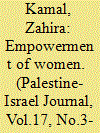

|
|
|
|
|
| Publication |
2011.
|
| Summary/Abstract |
The concept of women's empowerment is historically associated with national liberation movements throughout the world. the contributions of the American civil rights movement, and contributions of feminist movements in developing countries in Latin America and Asia. This concept focused on collective empowerment challenging the stereotypes about gender relations and was used, clearly and explicitly. in the l970s in order to launch the struggle for social justice and equality between women and men._ and facilitated through the establishment of economic, social and political structures. During the 1990s this concept lost its original transformational, and to a degree radical. concept, when it was linked to the ongoing transformations in the global economy and changes in the nature of the state and civil society. and to improvements at the level of development theories. Development discourse has focused on expanding women's options and levels of production as individuals, in most cases apart from the work programs of' women's -movements in the context of the state's withdrawal and abandoning of' its responsibilities in the spheres of economic and social support.'
|
|
|
|
|
|
|
|
|
|
|
|
|
|
|
|
| 2 |
ID:
108680
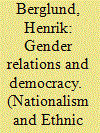

|
|
|
|
|
| Publication |
2009.
|
| Summary/Abstract |
The Hindu nationalist movement has for the last decades tried to expand within the Indian civil society, and a part of their strategy has been to increase the support for their views on gender relations. This article focuses on this mobilization and the response to it from the autonomous women's movement. It is suggested that the Hindu Nationalist groups have a very different view on gender relations compared to the main stream of the Indian women's movement, and that the mobilization of the Hindutva forces has met with strong resistance. It is further argued that this resistance may contribute to the deepening and widening of the democratic space in India.
|
|
|
|
|
|
|
|
|
|
|
|
|
|
|
|
| 3 |
ID:
086554
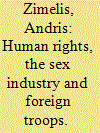

|
|
|
|
|
| Publication |
2009.
|
| Summary/Abstract |
This article explores the relationship between prostitution, nationalism and foreign policies using a feminist analysis framework. Although scholars have dealt with the theoretical role of women in nationalist projects, there is little work factually supporting these theories. There is also a paucity of works demonstrating the role of prostitution in national security policies. This article rectifies these shortcomings and demonstrates that, although prostitution is illegal in Japan, South Korea and the Philippines, these governments have played an active role in supporting and maintaining the prostitution industry geared at servicing US troops. The US troops, in turn, have protected the national security of each of these countries for all of the post-Second World War era. In this context, it seems clear that `national security' does not include the physical, economic, legal and social insecurity of Japanese, Korean and Filipino women despite their contribution to the most quintessential Realist policy - national security.
|
|
|
|
|
|
|
|
|
|
|
|
|
|
|
|
| 4 |
ID:
106947


|
|
|
|
|
| Publication |
2011.
|
| Summary/Abstract |
Recently, there have been many compelling new theories of the emergence of an "Islamic public sphere." Few studies, however, have examined the role of literary writing in contributing to its emergence, even though such writing was critical to the intellectual elite's shift toward Islamic subjects in mid-20th century Egypt. In addition, little of this scholarship has examined the gendered nature of this public sphere in any depth, though gendered rights, roles, and responsibilities were among the most hotly contested debates in public discourses on religion. This article looks at how literary writing not only shaped particular interpretations of gendered relationships in Islam but also developed hermeneutical techniques for reinterpreting religious sources. It specifically examines the work of Egyptian literary scholar and Islamic thinker Bint al-Shati? and how her writings helped define the nature of the family, gender relations, and the private sphere in Islamic public discourse.
|
|
|
|
|
|
|
|
|
|
|
|
|
|
|
|
| 5 |
ID:
114637


|
|
|
|
|
| Publication |
2012.
|
| Summary/Abstract |
The use of the mobile phone to contact research subjects granted me privileged access to a body of poetic and humorous texts. This article examines Cape Verdeans' use of pass-forward text messages to express allegiances to different collective identities that provide information and inspiration for Cape Verdeans living in Portugal. They are used to foment and express solidarity between Cape Verdeans, Africans, Christians and Women. An analysis of their contents elucidates two aspects of belonging. Firstly, the personal and intimate which tends to the Self, in its yearnings for a better future and for intimate relationship, sought through religious communion and romance. Secondly, the political and discursive which foments community, imagined not only through nation, Pan-Africanism and gender, but also beyond any such boundaries towards an all-inclusive dimension of belonging, rooted in relations of solidarity.
|
|
|
|
|
|
|
|
|
|
|
|
|
|
|
|
| 6 |
ID:
127144
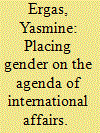

|
|
|
| 7 |
ID:
139464
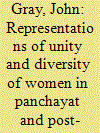

|
|
|
|
|
| Summary/Abstract |
This paper analyses the changes in the ways in which the diversity of women in Nepal has been conceived and represented from the Panchayat Democracy era in the 1960s to the current period of constitution-writing for a new federated state of Nepal. The various forms of diversity attributed to women—cultural differentiation, hierarchical differentiation, quantitative differentiation and substantive differentiation—have been and are being constructed in juxtaposition to various forms of unity—gender, universal, national unification and the ‘Third World woman’ in need of development. These varied configurations of unity–diversity have different implications for the women's movement and its quest to redress the historical subordination, oppression and exclusion that have been suffered by Nepali women.
|
|
|
|
|
|
|
|
|
|
|
|
|
|
|
|
| 8 |
ID:
144163
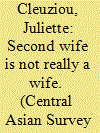

|
|
|
|
|
| Summary/Abstract |
While polygyny in Tajikistan existed before the collapse of the Soviet Union in 1991 and has been a phenomenon of growing importance since Independence, it is still forbidden by law. To understand this renewal, I do not look at polygyny as a sign of religiousness, but as a form of patriarchal bargain in which women (who often experienced former matrimonial disjuncture) may have a greater power of decision in the spousal relations. I will explore women's points of view, from which polygyny is a strategy to accessing the symbolic and material resources they lack. I then explore the conditions to which becoming a second wife is possible: women's own resources, be they material, symbolic, familial, appear as of crucial importance in this accession to the status of being married anew.
|
|
|
|
|
|
|
|
|
|
|
|
|
|
|
|
| 9 |
ID:
028819
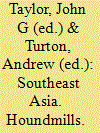

|
|
|
|
|
| Publication |
Houndmills, Macmillan Education Ltd., 1988.
|
| Description |
xi, 280p.hbk
|
| Series |
Sociology of Developing Societies
|
| Standard Number |
0333292774
|
|
|
|
|
|
|
|
|
|
|
|
Copies: C:1/I:0,R:0,Q:0
Circulation
| Accession# | Call# | Current Location | Status | Policy | Location |
| 030691 | 959.03/TAY 030691 | Main | On Shelf | General | |
|
|
|
|
| 10 |
ID:
106080


|
|
|
|
|
|
|
|